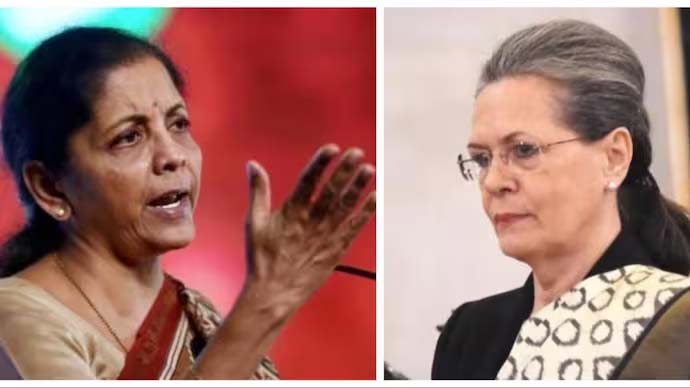Finance Minister Nirmala Sitharaman on Friday launched a scathing attack on the Congress, saying Sonia Gandhi was the “super Prime Minister” whose leadership was at the heart of the problem of mismanagement of the economy during UPA rule.
In her reply in the Lok Sabha on the discussion on the white paper on the Indian economy, Sitharaman said the paper did not contain any baseless allegations and everything mentioned in it was based on evidence.
“Leadership was at the heart of the UPA’s mismanagement and corruption-driven 10 years of government. The central problem point during the UPA era was a rudderless and leaderless government. Sonia Gandhi acted as the ‘Super Prime Minister’, as the Chairperson of the NAC (National Advisory Council). NAC had unaccountable and unconstitutional powers. Why did files go to such an unaccountable and unanswerable body for approval?” Sitharaman asked.
She said the andolan jivis (one who thrive on protests) who were members of the NAC used to prepare legislations, including the Right to Food and the Right to Information. “Should that be acceptable to the members of Parliament?” she asked.
“When Dr Manmohan Singh was on a tour, Congress leader Rahul Gandhi tore up the ordinance in a press conference. Wasn’t that insulting the country’s Prime Minister? He (Rahul Gandhi) didn’t care for his own Prime Minister,” she said.
Sitharaman also said under the UPA government there was “glaring mismanagement of the defence sector” and its highlight was the Rs 3,600 crore AgustaWestland scam.
“Critical shortage of ammunition & defence equipment was the main feature of 2014 when we inherited the economy. Bulletproof jackets were not available for our soldiers. Night vision goggles were not available,” Sitharaman said.
She said ‘Jayanti Tax’ during the UPA tenure delayed environment clearances for projects up to a year.
The average time to clear projects increased to 316 days from 86 days between 2011 and 2014.
She said 10 years of dedicated efforts of the Prime Minister Narendra Modi-led government have put the economy back on rails.
“We corrected all misgovernance and focused on reforms,” Sitharaman said, adding the average environment clearance time for projects came down to 70 days.
The minister said big-ticket corruption during the UPA tenure averaged one each year and common people were disillusioned.
The Modi government more than doubled its defence budget to Rs 6.22 lakh crore for fiscal 2024-25, from Rs 2.53 lakh crore in 2013-14, she added.
Responding to members’ allegation that the Enforcement Directorate (ED) has become a government tool, Sitharaman said under the Modi government, ED has been given “independence” to pursue cases under the Prevention of Money Laundering Act (PMLA).
Giving a comparative analysis of the conviction, restitution, extradition and red corner notices issued during the UPA versus NDA governments, she said the number was zero during the Congress-led government.
During the Modi regime, she said ED filed 1,200 prosecution cases and recovered Rs 16,333 crore and convicted 58 people.
Also, 24 Red Corner Notices (RCNs) were issued, 12 offenders were declared fugitives and Rs 906.74 crore was recovered from fugitive economic offenders.
Talking about the Production Linked Incentive (PLI) schemes, she said,” So far, seven lakh direct and indirect jobs have been created. Fourteen sectors benefit from the PLI Schemes brought by our government. Manufacturing locations are coming up in 24 states and more than 150 districts.”
The government has committed nearly Rs 1.97 lakh crore over five years starting 2021-22. Rs 1.07 lakh crore worth of investment has been committed under the PLI Schemes.
She said that average inflation under the Modi government has never crossed 8 per cent, whereas in the past three years of UPA’s tenure, the annual average inflation was in double digits.
Sitharaman said Rs 2.7 lakh crore was saved because of the Aadhaar authenticated Direct Benefit Transfers (DBT).
Earlier, initiating the discussion, Sitharaman said the Congress-led UPA government had put “family first” and left the country in “dire straits” in 2014, but it was now lecturing the Modi government on handling the economy.
Sitharaman said the Modi government put the “nation first”, and took the economy from ‘fragile five’ to ‘top five’. India was now on the way to becoming the third-largest global economy, she said.
“Ten years of one government with some crises and 10 years of a different government with a different crisis. The comparison shown in this ‘White Paper’ clearly says how if the government handles it with true sincerity, transparency and putting the nation first, the results are there for everybody to see,” Sitharaman said.
She also said, “When you don’t put the nation first, when you put your first family first, and when you have other considerations than transparency, the results are out there for you to see. So what happened after 2008 when there was a global financial crisis and what happened post-Covid shows clearly that if the intent of the government is sincere, results will be good.”
The Modi government leadership was clear in adopting a nation-first policy and working to make India a developed country by 2047, she said.




